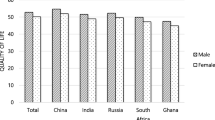Abstract
The aim of this study is to bring into focus the living conditions of the older adults in Turkey by using quality of life (QoL) criteria through which to highlight dimensions relating to their QoL status in comparison to other age cohorts. Are there specific QoL issues among older adults that would indicate that they display systematic differences in comparison to other age cohorts in Turkey? To what extent are there gender differences among older adults in QoL status? Data from the EQLS conducted in 2007 provided the information for understanding the self-reported conditions of older adults. Analysis shows that, for historical and contemporary reasons, older adults in Turkey form a disadvantaged cohort compared to other groups. The level of deprivation among a large segment of older adults is noteworthy in terms of income, health, material living conditions and social relations. Moreover, current social policies are blind to the low level of welfare, cultural capital, and connectedness of older women, resulting in unacceptable levels of alienation, unhappiness, and marginal status.
Zusammenfassung
Das Ziel dieser Studie ist es, die Lebensbedingungen älterer Menschen in der Türkei mittels definierter Kriterien für Lebensqualität [“quality of life“ (QoL)] festzustellen und diese mit der von anderen Altersgruppen zu vergleichen. Gibt es spezifische QoL-Indikatoren bei älteren Menschen, die auf signifikante Unterschiede im Vergleich mit anderen Altersgruppen in der Türkei hinweisen? Inwieweit gibt es geschlechtsspezifische Unterschiede im QoL-Status bei älteren Menschen? Daten aus dem European Quality of Life Survey (EQLS), die im Jahr 2007 veröffentlicht wurden, dienen zusätzlich einem besseren Verständnis hinsichtlich der Selbsteinschätzung der Lebensbedingungen älterer Menschen. Die Untersuchung zeigt, dass ältere Menschen in der Türkei im Vergleich zu anderen Bevölkerungsgruppen aufgrund von historischen und aktuellen Bedingungen eine benachteiligte Kohorte darstellen. Das Niveau der Deprivation ist bei einem großen Teil der älteren Menschen in der Türkei bemerkenswert in Bezug auf Einkommen, Gesundheit, materielle Lebensbedingungen und soziale Beziehungen. Darüber hinaus ist die aktuelle Sozialpolitik blind gegenüber dem niedrigen Wohlfahrtsniveau, dem geringen Sozialkapital und der mangelhaften sozialen Einbindung älterer Frauen, was zu einem unannehmbaren Ausmaß an Benachteiligung, Unzufriedenheit und Marginalisierung führt.
Similar content being viewed by others
References
Allardt E (1993) Having, loving, being: an alternative to the Swedish model of welfare research. In: Nussbaum M, Sen A (eds) In the quality of life. Clarendon Press, Oxford, pp 88–94
Anderson R, Mikulic B, Vermeylen G et al (2009) Second European quality of life survey-overview. European Foundation for the Improvement of Living and Working Conditions, Dublin
Arun Ö (2013) Ageing in Turkey: the Peter Pan syndrome? In Troisi J, Kondratowitz HJ von (eds) Ageing in the Mediterranean. Policy Press, London
Arun Ö (2012) Cultivated citizens? Cultural capital, class, gender and generations in contemporary Turkey. METU studies in development 39(3):283–302
Arun Ö, Çakıroğlu Çevik A (2011) Quality of life in aging societies: Italy, Portugal and Turkey. Edu Gerontol 37(11):945–966
Böhnke P (2005) First European quality of life survey: life satisfaction, happiness and sense of belonging. European Foundation for the Improvement of Living and Working Conditions, Dublin
Bowling A (2007) Quality of life in older age. In: Mollenkopf H, Walker A (eds) Quality of life in old age. Springer, Netherlands, pp 15–30
Christoph B, Noll HH (2003) Subjective well-being in the European Union during the 90s. Soc Indic Res 64:521–546
Fahey T, Nolan B, Whelan CT (2003) Monitoring quality of life in Europe. European Foundation for the Improvement of Living and Working Conditions, Dublin
Hajiran H (2006) Toward a quality of life theory: net domestic product of happiness. Soc Indic Res 75:31–43
Noll HH (2004) Social indicators and quality of life research: background, achievement and current trends. In Genov N (ed) Advances in sociological knowledge over half a century. VS Verlag für Sozialwissenschaften, Wiesbaden
Saraceno C (2004) Introduction: Quality of life in Europe, first results of a new pan-European survey 2003. European Foundation for the Improvement of Living and Working Conditions, Dublin
Shackman G, Liu Y, Wang X (2005) Measuring quality of life using free and public domain data. Soc Res Update 47
Sirgy MJ (2001) Handbook of quality of life research: an ethical marketing perspective. Kluwer, London
Tufan I (2009) Health behavior among the elderly in Turkey: an early evaluation of the geroatlas study. Edu Gerontol 35:383–392
Tufan I (2009) Ageing and the elderly in Turkey: results of the first age report from Turkey. Z Gerontol Geriatr 42(1):47–52
Acknowledgments
I am particularly grateful to Patricia Brownell, Jason Holdsworth, and anonymous reviewer(s) of ZfGG. Their comments helped me to refocus my arguments.
Conflict of interest
The corresponding author states that there are no conflicts of interest.
Author information
Authors and Affiliations
Corresponding author
Rights and permissions
About this article
Cite this article
Arun, Ö., Çakıroğlu-Çevik, A. Quality of life in an ageing society. Z Gerontol Geriat 46, 734–739 (2013). https://doi.org/10.1007/s00391-013-0502-z
Published:
Issue Date:
DOI: https://doi.org/10.1007/s00391-013-0502-z




